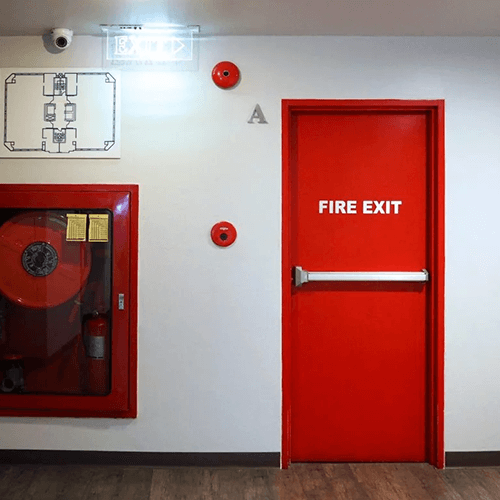
Although safety measures are implemented, no commercial building is immune to threats, including fire. Any business owner should want to protect their property from going up in smoke while ensuring employees and visitors are safe. To do this, maybe you've invested in various fire safety mechanisms, like fire-rated doors.
The use of fire-rated doors on commercial property is crucial to the safety of everyone involved. Regardless of your business, you likely take advantage of the security these specially designed doors offer. With their superior features, fire-rated doors are the ideal solution for providing safety in your commercial building.
You've likely seen a fire-rated door before. These safety mechanisms are one of the most common commercial door types and act as a barrier against smoke, flames, and intense heat caused by a fire.
Installing these vital components throughout your building, office, or factory can prevent the blaze from spreading through every floor and room of your facility. This gives you valuable time to get help to put out the fire or evacuate the premises. Some fire-rated doors can resist damage for a minimum of 20 minutes, and others protect for up to 3 hours.
After they've been manufactured, they go through a rigorous testing process. Throughout this process, they are rated on how well they handle exposure to fire and high temperatures.
Each door receives a rating measured in hours. A door with a rating of 0.5 can withstand exposure to direct fire for 30 minutes. Typically, fire protection ratings are:
The higher the rating, the more resistant the door will be against fire and heat.
Fire doors are commonly made from hollow metal, solid wood, or fire-resistant glass. These materials work to slow down a fire almost as soon as they come into contact. For additional security, fire doors have intumescent seals that expand if the temperature exceeds 392 degrees Fahrenheit. When this happens, they eliminate the gap between the corresponding entry and doorway and prevent an influx of smoke.
Fire doors have a variety of locks, like a crash bar or an electronic lock. These are no different than a lock you'd find on traditional doors.
Every commercial building must have fire doors in the United States — it's the law. They are to protect employees, customers, and other visitors that may come onto your commercial property. Although U.S. municipalities can determine their building codes, most follow the National Fire Protection Association regulations for fire protection.
Some spaces in commercial buildings require more protection than others. Your door installations must remain compliant with security and safety regulations. These are the guidelines for installing fire-rated doors in a commercial building.
When a fire occurs, closing off sections of your building with a fire-rated door isolates the flames and fumes. This isolation reduces the spread to other rooms. Fire-rated doors also give occupants a way to escape.
Any two buildings that are attached benefit from being connected with a fire-rated door. This ensures safe and easy access because it automatically opens and closes while providing fire protection during an emergency.
Fire-rated doors must be placed near stairwells or elevator shafts. These structures are often a primary exit for occupants during an emergency.
Many commercial buildings have prohibited areas where hazardous chemicals or dangerous operations occur. For example, hotels and restaurants separate their kitchen from the dining area because patrons may not be familiar with the safety protocols within that area.
Commercial properties without fire-rated doors in the right area can face legal penalties. But it's not that cut and dry. Even if you have an adequate number of fire-rated entries, you could face charges for unlawful use. For example, if your doors are obstructed by boxes or containers, they cannot open and close as needed.
Breaking fire-rated door laws puts you at risk of serving jail time and paying a substantial fine. It's best if you follow the rules and have an appropriate number of fire-rated doors in the right location and are free from obstructions.
Contact CDF Distributors today to learn about our fire-rated doors.